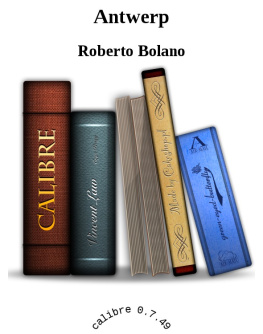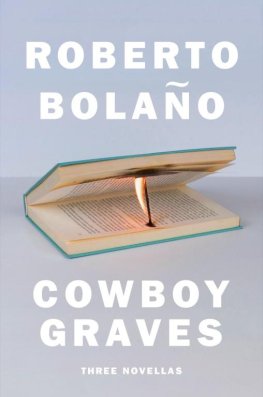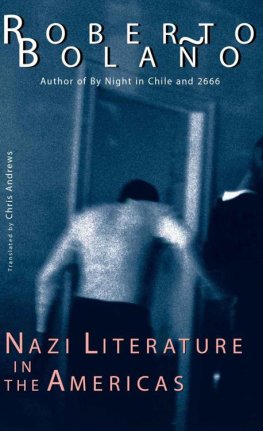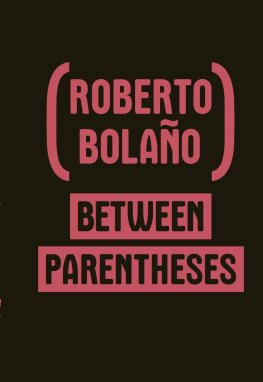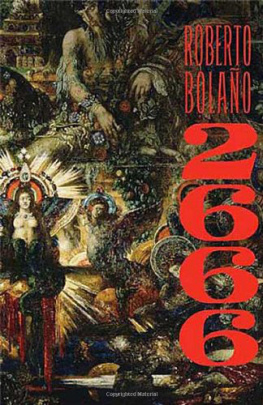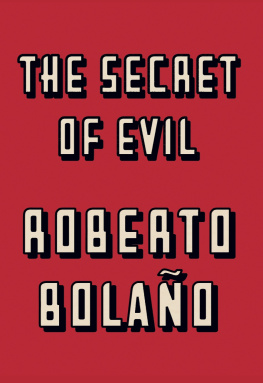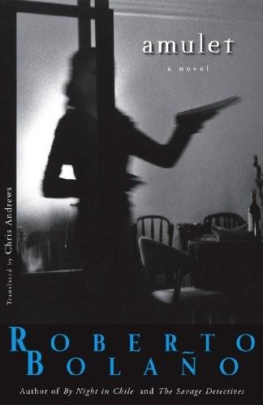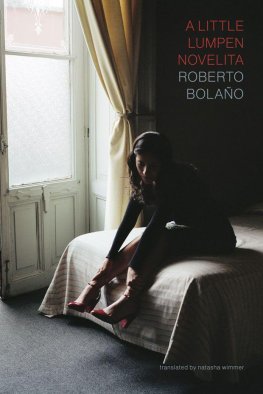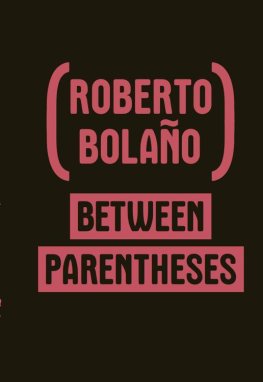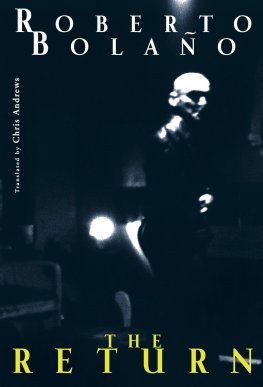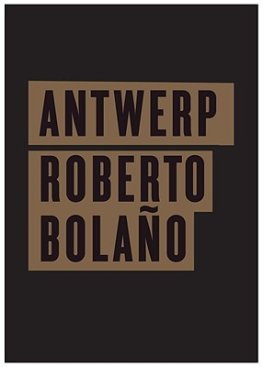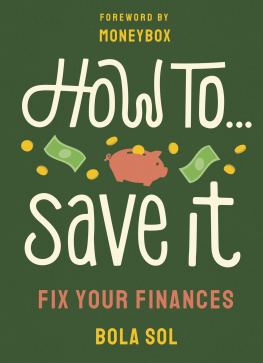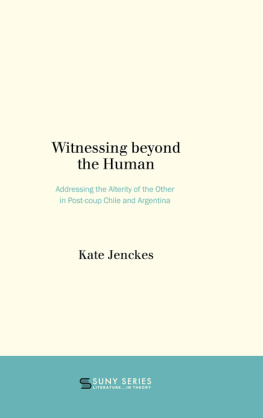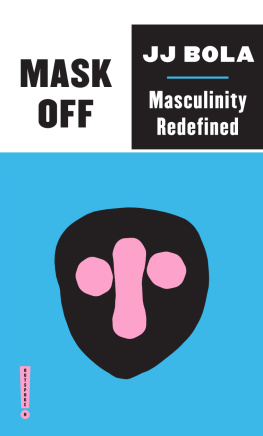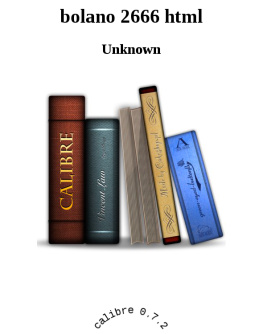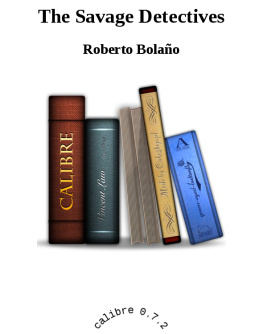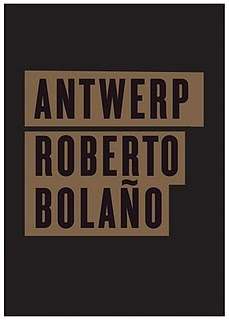FROM NEW DIRECTIONS Amulet By Night in Chile Distant Star Last Evenings on Earth Monsieur Pain Nazi Literature in the Americas The Romantic Dogs The Skating Rink
Antwerp .
ROBERT O BOLAO
Translate d by Natasha Wimmer
A NEW DIRECTIONS BOOK
Copyrigh t 2002 by Roberto Bolao
Translation copyright 2002 by Natasha Wimmer
Originally published by Anagrama Barcelona Spain as Amberes in 2002; published by arrangement with the Heirs of Roberto Bolao and Carmen Balcells Agencia Literaria, Barcelona
All rights reserved. Except for brief passages quoted in a newspaper, magazine, radio, or television review, no part of this book maybe reproduced in any form or by any means, electronic or mechanical, including photocopying and recording, or by any information storage and retrieval system, without permission in writing from the Publisher.
Publisher'sNote: The Pascal epigraph is taken from A. J. Krailsheimer's translation for the Penguin Classics edition, slightly altered.
Manufactured in the United States of America New Directions Books are printed on acidfree paper. First published clothbound by New Directions in 2010 Published simultaneously in Canada by Penguin Books Canada Limited Design by Erik Rieselbach
Library of Congress Catalogingin Publication Data
Bolao, Roberto, 19532003. [Amberes. English] Antwerp / Roberto Bolao; translated by Natasha Wimmer. p. cm. "A New Directions book." "Originally published by Anagrama Barcelona Spain, as Amberes in 2002 ..."T.p. verso. ISBN 9780811217170 (hardcover: alk. paper)
I. Wimmer, Natasha. II. Title. PQ8098.12.038A6313 2010 863dc22
2009042903
New Directions Books are published for James Laughlin by New Directions Publishing Corporation, 80 Eighth Avenue, New York, NY 10011
forAlexandraBolaoandLautaroBolao
TotalAnarchy:TwentyTwoYearsLater
I wrote this book for myself, and even that I can't be sure of. For a long time these were just loose pages that I reread and maybe tinkered with, convinced I had no time. But time for what? I couldn't say exactly. I wrote this book for the ghosts, who, because they're outside of time, are the only ones with time. After the last rereading (just now), I realize that time isn't the only thing that matters, time isn't the only source of terror. Pleasure can be terrifying too, and so can courage. In those days, if memory serves, I lived exposed to the elements, without my papers, the way other people live in castles. I never brought this novel to any publishing house, of course. They would've slammed the door in my face and I'd have lost the copy. I didn't even make what's technically termed a clean copy. The original manuscript has more pages: the text tended to multiply itself, spreading like a sickness. My sickness, back then, was pride, rage, and violence. Those things (rage, violence) are exhausting and I spent my days uselessly tired. I worked at night. During the day I wrote and read. I never slept. To keep awake, I drank coffee and smoked. Naturally, I met interesting people, some of them the product of my own hallucinations. I think it was my last year in Barcelona. The scorn I felt for so-called official literature was great, though only a little greater than my scorn for marginal literature. But
believed in literature: or rather, I didn't believe in arrivisme or opportunism or the whispering of sycophants. I did believe in vain gestures, I did believe in fate. I didn't have children yet. I was still reading more poetry than prose. In those years (or months), I was drawn to certain science fiction writers and certain pornographers, sometimes antithetical authors, as if the cave and the electric light were mutually exclusive. I read Norman Spinrad, James Tiptree, Jr. (whose real name was Alice Sheldon), Restif de la Bretonne, and de Sade. I also read Cervantes and the archaic Greek poets. When I got sick I reread Manrique. One night I came up with a scheme to make money outside the law. A small criminal enterprise. The basic idea was not to get rich too fast. My first accomplice or attempt at an accomplice, a terribly sad Argentinean friend, responded to my scheme with a saying that went something like this: if you have to be in prison or in the hospital, then the best place to be is your own country, for the visitors, I guess. His response didn't have the slightest effect on me, because I felt equally distant from all the countries in the world. Later I gave up my plan when I discovered that it was worse than working in a brick factory. Tacked up over my bed was a piece of paper on which I'd asked a friend from Poland to write, in Polish, Total Anarchy. I didn't think I was going to live past thirty-five. I was happy. Then came 1981, and before I knew it, everything had changed.
BLANES, 2002
Whe n I consider the brief span of my life absorbed into the eternity which comes before and aftermemoriahospitisuniusdieipraetereuntisthe small space I occupy and which I see swallowed up in the infinite immensity of spaces of which I know nothing and which know nothing of me, I take fright and am amazed to see myself here rather than there: there is no reason for me to be here rather than there, now rather than then. Who put me here? By whose command and act were this place and time allotted to me?
PASCAL
Antwer p
1 . FAADE
Oncephotographed,lifehereisended.ItisalmostsymbolicofHollywood.Tarahasnoroomsinside.Itwasjustafaade.
David O. Selznick
The kid heads toward the house. Alley of larches. The Fronde. Necklace of tears. Love is a mix of sentimentality and sex (Burroughs). The mansion is just a faade dismantled, to be erected in Atlanta. 1959. Everything looks worn. Not a recent phenomenon. From a long time back, everything wrecked. And the Spaniards imitate the way you talk. The South American lilt. An alley of palms. Everything slow and asthmatic. Bored biologists watch the rain from the windows of their corporations. Its no good singing withfeeling. My darling, wherever you are: its too late, forget the gesture that never came. It was just a faade. The kid walks toward the house.
2. THE FULLNESS OF THE WIND
Twin highways flung across the evening, when everything seems to indicate that memory and finer feelings are kaput, like the rental car of a tourist who unknowingly ventures into war zones and never returns, at least not by car, a man who speeds down highways strung across a zone that his mind refuses to accept as a barrier, vanishing point (the transparent dragon), and in the news Sophie Podolski is kaput in Belgium, the girl from the Montfaucon Research Center (a smell unbefitting a woman), and the spent lips say I see waiters, hired for the summer, walking along a deserted beach at eight oclock at night Slow movements, real or unreal I dont know A sandswept group For an instant, a fat elevenyearold girl lit up the public pool So is Colan Yar after you too? The highway, a blacktopped strip of prarie? The man sits at one of the cafes in the hypothetical ghetto. He writes postcards because breathing prevents him from writing the poems hed like to write. I mean: free poems, no extra tax. His eyes retain a vision of naked bodies coming slowly out of the sea. Then all thats left is emptiness. Waiters walking along the beach The evening light dismantles our sense of the wind

